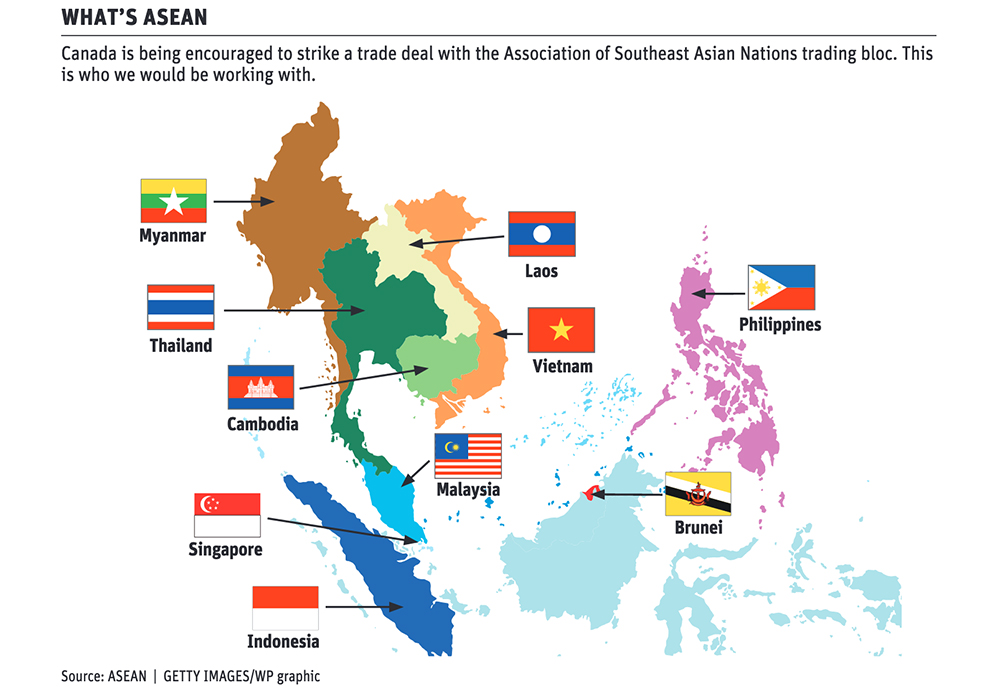‘Middle power’ countries encouraged to double down on free trade promotion and the international rules-based order
As the world talks about trying to “build back better” and the “post-COVID world,” Canada should get in front by making a free trade deal with Southeast Asia.
That argument is being made by the C.D. Howe Institute’s Daniel Schwanen and Dan Ciuriak in a letter sent to the trade officials of both Canada and the Association of South East Asian Nations (ASEAN).
“As every country evolves its own policies to take advantage of new trends and technologies that will accelerate post-pandemic, they will need the reliability and flexibility of a common platform that makes trade easier, fosters innovative business and professional relationships, and promotes fair competition and high product and services and standards,” say Schwanen and Ciuriak in the Aug. 25 letter.
Read Also

Critical growing season is ahead for soybeans
What the weather turns out to be in the United States is going to have a significant impact on Canadian producers’ prices
“A Canada-ASEAN trade agreement should be the centrepiece of such a move, helping position its members for growth as the world economy struggles to recover.”
While some have become dejected and pessimistic about the state of world trade since a new protectionist wind began blowing from countries like the United States, China and India, others have called for “middle powers” like Canada to double-down on free trade promotion and the international rules-based order.
That’s where this call appears to come from, seeing a deeper interaction between Canada and the fellow middle powers of the ASEAN as a way of strengthening all.
“ASEAN and Canada are both trade-dependent economies with similar interests in maintaining supply lines as open as possible and subject to minimal disruption of cross-border flows of medical and other critical goods and in travel routes and transport logistics,” they write.
“An (early) agreement… would strengthen trade flows and the opening of negotiations would send a strong positive signal to markets at a time when uncertainty clouds every horizon.”
The writers believe the grounds are good for an agreement because the two sides have “complementary economies” that would not see the other side as an economic threat.
Already two of the ASEAN nations are part of the Comprehensive and Progressive Agreement for Trans-Pacific Trans Pacific Partnership and involved with Canada as a free trade partner. That experience could help other ASEAN members see how improving trade and investment between Canada and the Asian nations could have benefits rather than dangers.
The ASEAN bloc already has a trade deal with Australia and New Zealand, which are countries that operate similar to Canada.
“From an ASEAN perspective the sensitive issues that such an agreement with Canada would raise have already been largely worked out in negotiations, and indeed, the internal economic adjustments have already been made,” says the letter.
Increased trade and investment across a new agreement would help improve global supplies that Canada and the ASEAN will be more keen to secure now that the pandemic has laid bare supply chain vulnerabilities involving some of the global giants.
For Canada, becoming closer attached to a part of the world economy that “could grow seven-fold over the next 30 years” would be a key benefit, while attaching itself to Canada’s advanced economy and its “preferential access to North America and Europe” would be a key benefit for the ASEAN.
Schwanen and Ciuriak urge Canada and the ASEAN to begin trade talks soon and “to bring such a trade agreement into force as expeditiously as possible.”


















